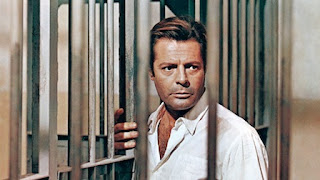
Jerry Seinfeld, who you should know from the popular TV show Seinfeld, as quite a lot in common with Albert Camus' Meursault, from the short-read The Stranger. The similarities that these characters share, through their friendships and their handling of situations, offer a greater view of Jerry and Mersault's outlook of life.
Don't get me wrong: both have friends. But, their friendships are not based on common connection. “Then he told me that as a matter of fact he wanted to ask my advice about the whole business, because I was a man, I knew about things, I could help him out, and then we’d be pals. I didn’t say anything, and he asked me again if I wanted to be pals. I said it was fine with me” (Camus 58). When Meursault’s neighbor, Raymond asks if they can be friends, Meursault responds indifferently. Meursault doesn't reject the idea of sharing a friendship with Raymond. He just isn't enthusiastic about it. If they were never neighbors and if Raymond had never asked, Meursault and Raymond would likely not have been “pals”. Similarly, Jerry and his friendship with Kramer and George lacks any underlying connection. Jerry and George, in particular, are seemingly opposite. Jerry is naturally funny and placid while George is uptight and nervous. In the first scene of the series that shows a conversation between Jerry and George, a waitress is about to pour the two men coffee. Jerry lets her pour it in, but George covers his cup and asks “Are you sure this is decaf? Where’s the orange indicator?” This scene shows just how different the two characters are from each other. They are not friends because of the connections they share but simply because they live near each other and got used to being together, like Meursault and Raymond.
 |
| Meursault |
Meursault and Jerry handle situations in a similar way: by not caring. In chapter four, Meursault hears shrieks coming from Raymond’s apartment. Instead of helping the person in Raymond's apartment, Meursault and his girlfriend stand idle and watch the scene, “Marie and I went to see, too. The woman was still shrieking and Raymond was still hitting her. Marie said it was terrible and I didn’t say anything. She asked me to go find a policeman, but I told her I didn’t like cops” (Camus 69). Meursault feels no need to interject; he lacks the moral responsibility that would make him do otherwise. Similarly, Jerry, in the last episode of Seinfeld, watches a man get carjacked at gunpoint.
Jerry doesn't care about the man getting robbed and moves on to make a phone call. He acts as a bystander, like Meursault. Unless something that immediately affects them, Jerry and Meursault respond to situations in a similar way: by doing nothing.
Jerry and Meursault have a similar outlook on life as a whole. Life does not matter, so it makes little sense to reject friendships. It is pointless to go out of your way to form new relationships because, in the end, after you die all will be forgotten. Similarly, why should you help someone else, when it will have made no difference if you chose to help or not help the other person? These are the absurdist ideals that both Jerry and Meursault live by. Though, you should not mistake these characters, however, as nihilist or existentialist (click here to understand the difference). They simply see no need to search for a meaning; you should embrace the absurd life and find happiness in it. This is different from accepting that the world has no meaning and so you must create a meaning of you own. This similarity, regarding their outlook of life, is perhaps the most convincing piece of evidence of the parallel between Meursault and Jerry.
Jerry doesn't care about the man getting robbed and moves on to make a phone call. He acts as a bystander, like Meursault. Unless something that immediately affects them, Jerry and Meursault respond to situations in a similar way: by doing nothing.
Jerry and Meursault have a similar outlook on life as a whole. Life does not matter, so it makes little sense to reject friendships. It is pointless to go out of your way to form new relationships because, in the end, after you die all will be forgotten. Similarly, why should you help someone else, when it will have made no difference if you chose to help or not help the other person? These are the absurdist ideals that both Jerry and Meursault live by. Though, you should not mistake these characters, however, as nihilist or existentialist (click here to understand the difference). They simply see no need to search for a meaning; you should embrace the absurd life and find happiness in it. This is different from accepting that the world has no meaning and so you must create a meaning of you own. This similarity, regarding their outlook of life, is perhaps the most convincing piece of evidence of the parallel between Meursault and Jerry.
No comments:
Post a Comment